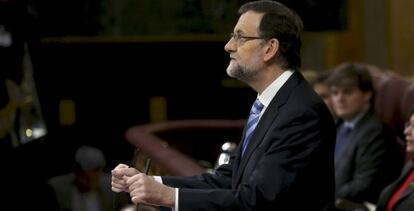Rajoy unveils tax break plan for workers and their employers
PM announces stimulus for job creation with flat-rate social security scheme Economists see little difference between proposals and current taxation structure Socialist leader accuses Rajoy of trying to “destroy equality” with abortion reform

Prime Minister Mariano Rajoy on Tuesday announced initiatives to create jobs and tax relief for workers and employers by lowering social security contributions for companies that take more people on to their payrolls.
The Popular Party (PP) leader also said workers earning less than 12,000 euros won’t have to pay income tax.
Forty minutes into his opening address in the State of the Nation debate in Congress, Rajoy focused on government estimates that show that the economy will grow 1.0 percent this year and 1.5 percent in 2015. The European Commission on Tuesday revised its forecast upward for Spanish growth for this year to 1.0 percent from 0.5 percent and predicted it would accelerate to 1.7 percent next year.
Rajoy said the pace of growth would be sufficient for net job creation
Rajoy said the pace of growth would be sufficient for net job creation and an increase in the number of people signed up with Social Security.
The conservative prime minister said the government would present its proposed overhaul of the tax system next month. “I can’t flag concrete details, but I can say that the tax burden will be eased and that 12 million taxpayers will benefit. Workers who earn less than 12,000 euros a year will not pay personal income tax (IRPF), and personal allowances for children and dependents with disabilities who live with the taxpayer will be raised.”
Some economists immediately pointed out that there was little difference between Rajoy’s proposal and the actual tax structure. Currently, workers who earn 11,162 euros a year don’t have to pay taxes.
“About 97 percent of the workers who earn 12,000 euros a year already don’t pay taxes and the rest pay less than 300 euros,” said Santiago Díaz de Sarralde, a professor of applied economics at King Juan Carlos University.
Rajoy also said the government planned to lower social security contributions for companies taking on workers on a permanent basis.
Employers’ social security contributions, according to Rajoy, are to be cut to a flat 100 euros a month for 24 months but if the company in question does not keep the employee on for three years, the reduction will have to be repaid.
Never has there been a government that has tried to destroy equality like yours"
Main opposition Socialist leader Alfredo Rubalcaba focused his attack on the PP government’s cuts in social services and its attempts to change the abortion law.
“Never has there been a government in the history of democracy that has tried to destroy equality as your government, Mr Rajoy,” said Rubalcaba.
As for the prime minister’s positive picture of the Spanish economy, Rubalcaba asked point blank: “Which country are you living in?”
The Socialist leader said that pensioners, workers and even the unemployed have seen their wages and benefits cut.
The other main theme of Rajoy’s speech was the independence drive in Catalonia. The prime minister expressed his concerns about “the fate of everyone who lives in Catalonia whose wealth and future are at risk,” before taking the line that he has always taken on the “indivisibility” of the Spanish nation enshrined in the Constitution. “We Spaniards have not known any condition other than that of unity and we don’t want to and neither should we break it,” he said.
He again warned the Catalan government that only the central government, as the representative of the Spanish nation, can sanction a vote on self-rule. “No one can unilaterally deprive the Spanish people as a whole of the right to decide on their future. Neither the government, nor any other state power, not even this house,” the prime minister said. “The referendum in Catalonia cannot be held; it’s illegal,” he added.
He said the government was always “open to dialogue but within the Constitution and the law.”
Josep Antoni Duran Lleida, parliamentary spokesman for the Catalan nationalist CiU bloc, urged Rajoy to sit down with the regional leaders to find a solution or otherwise the prime minister was going to find “an amputated Spain.”
“Each one of us has to discuss the issues without any fine red lines. We are ready to talk even though that means that we have to put ourselves at the other’s disposal,” Duran Lleida said.
Cayo Lara, of the Plural Left coalition, said Rajoy’s victorious demeanor over the economy was “deeply embarrassing.”
Tu suscripción se está usando en otro dispositivo
¿Quieres añadir otro usuario a tu suscripción?
Si continúas leyendo en este dispositivo, no se podrá leer en el otro.
FlechaTu suscripción se está usando en otro dispositivo y solo puedes acceder a EL PAÍS desde un dispositivo a la vez.
Si quieres compartir tu cuenta, cambia tu suscripción a la modalidad Premium, así podrás añadir otro usuario. Cada uno accederá con su propia cuenta de email, lo que os permitirá personalizar vuestra experiencia en EL PAÍS.
¿Tienes una suscripción de empresa? Accede aquí para contratar más cuentas.
En el caso de no saber quién está usando tu cuenta, te recomendamos cambiar tu contraseña aquí.
Si decides continuar compartiendo tu cuenta, este mensaje se mostrará en tu dispositivo y en el de la otra persona que está usando tu cuenta de forma indefinida, afectando a tu experiencia de lectura. Puedes consultar aquí los términos y condiciones de la suscripción digital.








































